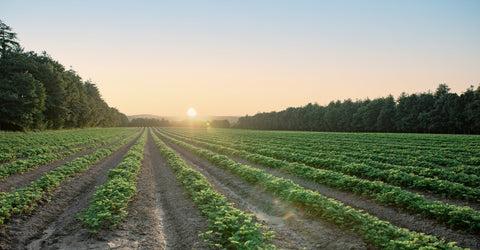Organic Products and Practices: Not Just For Organic Growers!
Conventional growers have several incentives for using organic products and cultural practices:
- The number and quality of products have increased substantially over the last few years.
- Pests can build resistance to traditional pesticides over time, making organic alternatives valuable so that growers have more options available to them.
- Consumer demand leans toward fewer chemicals used on produce purchased. According to a 2022 report, global sales of organic food have increased over 100 billion U.S. dollars since 2000.
Before diving into organic products, we want to highlight two key factors for your success: site selection and preparation.
An ideal site should have:
- close proximity to your market(s);
- sufficient acreage to allow for crop rotation;
- available water of acceptable quality for irrigation and frost protection;
- well-drained soil; and
- good air movement and drainage.
Our Fall 2024 Newsletter offers an in-depth article on site selection—well worth a read!
Cover crops should also be considered as growers look to site preparation. Here at Nourse Farms, we regularly use sorghum sudan grass as a cover crop. Cover crops improve soil health by enhancing organic matter, breaking up compaction, suppressing weeds, and providing nutrients. In small fruit production, they are especially valuable before planting, helping to control erosion, manage nematodes, and create optimal growing conditions.
Below, we have outlined organic products and practices that Nourse Farms customers have tried and used. While we can’t guarantee their effectiveness, our customers have reported successful seasons using these products and practices.





Beneficial Insects
Beneficial insects play an essential role not only in organic production but for many conventional growers as well. Beneficial insects can pollinate, improve soil health, and even provide natural pest control.
Predators: Insects such as ladybugs, lacewing larvae, and predatory beetles that control aphids, mites, thrips, and other pests.
Parasitoids: Wasps (e.g., Encarsia formosa) parasitize and control pests like whiteflies and aphids. Current trials are testing the use of wasps for Spotted Wing Drosophila control.
Pathogens: Some beneficial insects release biological agents, such as nematodes or fungi, to combat soil-borne pests like root weevils.
Herbicides
An organic herbicide strategy can be advantageous in a robust and diversified weed management program. However, relying on organic herbicides alone may require frequent re-applications for sustained weed control. Organic herbicides burn back to the ground small established weeds; they do not prevent weed seeds from germinating. The weeds will regrow if they have perennial roots. Organic herbicides have the best results in handling small annual weeds that have germinated around the crops rather than tackling areas with established perennial weeds.
Organic herbicides are non-selective, post-emergent, contact herbicides. We strongly advise reading the warning labels and carefully following the application instructions provided on the labels. Warnings and application instructions may vary between brands; always read the label before each use. It is essential to ensure the herbicide does not contact the crop plants during spray application, as the spray may damage them, particularly strawberry plants. Using a hooded sprayer may help prevent crop contact and associated injury. High spray volumes are required to obtain sufficient coverage for ideal weed control.
Products include Ecoblend Weed Control Pro (soybean oil, citric acid), Finalsan Herbicidal Soap (ammoniated soap of fatty acid), Harris 20% Vinegar Weed Killer (acetic acid), and Suppress Herbicide EC (capric acid, caprylic acid).
Please contact Anne Kowaleck, Sales Director at akowaleck@noursefarms.com, for a complete list of organic products and their suppliers.
Nourse Farms appreciates and thanks Adam Hausmann, Adam’s Berry Farm in Charlotte, Vermont, and Josh Morganthau, Fishkill Farms in Hopewell Junction, New York, for their assistance and collaboration with this article.
This article is a part of Nourse Farms' Spring 2025 Commercial Growers Newsletter. View the whole newsletter by clicking here.



